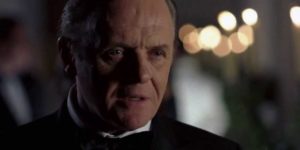
Opera Meets Film: How Opera Adds Narrative Depth To Ridley Scott’s ‘Hannibal’
By David Salazar“Opera Meets Film” is a feature dedicated to exploring the way that opera has been employed in cinema. We will select a section or a film in its entirety, highlighting the impact that utilizing the operatic form or sections from an opera can alter our perception of a film that we are viewing. This week’s installment features Ridley Scott’s “Hannibal.’
“Hannibal” is one of those rare movies that incorporates a newly composed opera solely for its dramatic purposes rather than utilizing something well-known from the repertory. Another such example would be “Citizen Kane,” where an opera is written specifically for an opera sequence within the story world.
As such, “Hannibal’s” famed opera sequence features “Vide Cor Meum,” a scene that relates the emotional struggles of Dante, Beatrice, and Amor. The music, composed by Patrick Cassidy is angelic and full of emotional and melodic purity, it’s lines delicate but rapturous.
Have a listen to the scene with the music interpreted by Danielle de Niese and Bruno Lazzaretti.
The introduction of the opera sequence in the film doesn’t really seem to reveal much narratively and yet when placed in the full context of the movie it is quite significant. First off, this sequence depicts Detective Pazzi seeing Hannibal at the opera. To this point, he has been chasing Hannibal around but this is the first hint that the famed murderer might be onto his trail. This is later confirmed by the eventual murder of the detective at the hands of Hannibal.
The music returns in a latter sequence as Hannibal sneaks into a house and a hospital in preparation for his next big crime. We don’t know it at the time, but he is preparing some particular justice for the next victim in much the same way he does for Pazzi.
The true importance and connection of these story moments and the music comes in many forms. The beauty of the music offsets the gore and horrifying nature of the crimes. Pazzi is hung from a tower and the second victim, Paul Krendler, eats his own brain for dinner.
It adds narrative complexity because both excerpts are closely linked and identified with the titular character, a man who we are supposed to fear, but for whom we feel a certain level of attraction and even empathy. In fact, when he is captured by Mason Verger, a man seeking retribution for Hannibal’s own actions toward him, we find ourselves confused about who we should be aligned with morally and emotionally. The music reflects this feeling contrasting sublime beauty of opera with the disgusting and vulgar violence on display throughout the film.
This emotional confusion is complicated further by Clarice Starling, who is the hero of the story, but has a very complicated relationship with Lector. He is her guardian angel and she his; his weakness for her is what causes his capture at the start and even gets him caught in handcuffs later in the movie. He pursues her incessantly and gets rid of her enemies, saving her from sure death on one occasion.
One can thus turn to the text of the “Vide Cor Meum” for some interpretative means to better understanding this relationship. Clarice is Beatrice, a pure soul that Dante elusively seeks for love and comfort; she is the source of his redemption. Beatrice is angelic and was Dante’s life-long love; Clarice, as Lector himself notes, is morally righteous and will always be on the side of the truth and good. He is attracted to her because she is his eternal opposite in every way possible; as such, she is also the only person that he trusts.
Meanwhile, Dante is a complicated figure who seeks that redemption because his soul is full of pain that he himself causes through the punishment of his enemies. His very Inferno tortures his enemies, much in the way Lector does his. Lector gives a lecture on Dante early in the film and makes references to some of the punishments that are doled out; he eventually makes use of those punishments against Pazzi and Krendler, further aligning him with Dante. Finally, Dante was a famed artist, something Lector seems to consider himself with regard to how he orchestrates and executes his murders. The links between the two men in this story could not be clearer.
The music thus suggests an idealization of the relationship between these two characters as Lector sees them; but the glaring emotional contrasts between the opera’s emotional purity and the reality of the story world are so at odds that they only illuminate the tragic nature of the latter.



